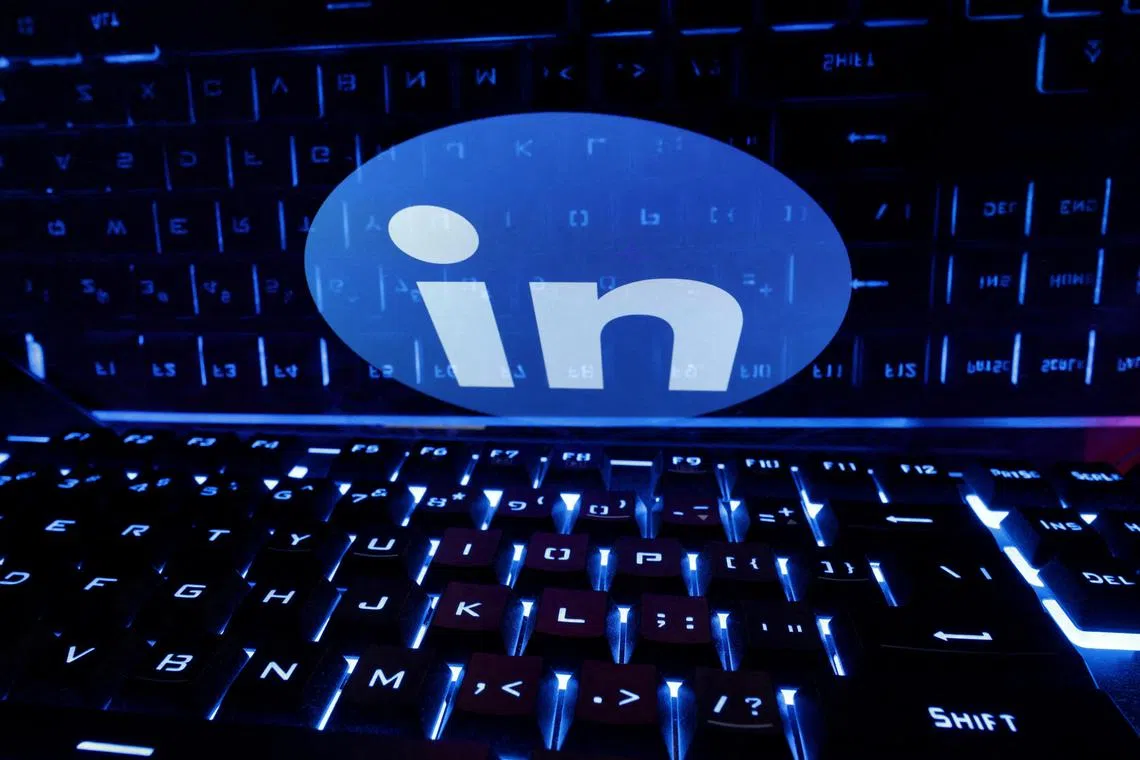Gen Z’s confessional style fuels generational divide on LinkedIn
Sign up now: Get tips on how to grow your career and money

Members of Gen Z are driving a content shift on the website.
PHOTO: REUTERS
Ms Ali Cudby spends a lot of time on LinkedIn, using the platform to network and find clients for her customer-retention business. But lately, she finds herself caught in what many users describe as a growing generational divide on the website.
The Gen X entrepreneur from Boston, who has an MBA from Wharton, is turned off by the barrage of performative content from hustle-culture influencers and artificial intelligence-generated “thought leadership”, not to mention the pet and vacation photos that increasingly populate her feed.
With her engagement numbers dropping, she recently consulted a social media expert, who advised her to post “more personal stuff” to increase her visibility. But it does not come naturally.
“That feels really inauthentic to me,” she said.
Ms Cudby’s dilemma is increasingly common for the job seekers and ambitious professionals who have long used LinkedIn to hunt for work and build their networks.
The job market has been sluggish for months and unemployment is rising as recession fears bubble to the surface, pushing more and more people to dust off their resumes and post on the Microsoft-owned website.
At the same time, AI has turbocharged the job market, allowing candidates to apply to hundreds of roles and upping the pressure to stand out online.
All the while, a generational shift is taking place as a more digitally open, confessional Gen Z gets into the job market.
It is prompting a debate for long-time users: How far is too far on LinkedIn?
“The tips we give everyone are the same: Come to LinkedIn ready to give back – help people on their economic paths by sharing what you know about work topics that matter to you,” said Mr Dan Roth, editor-in-chief and vice-president of product at the company. “The more open and authentic you are, the more likely you’ll get people talking and responding.”
LinkedIn was founded 22 years ago, before Facebook, Instagram, Twitter – and even MySpace – existed. The platform has been experimenting with content for years, with a fluctuating mix of congratulatory career updates, news, newsletter and influencer “thought leadership”.
These days, members of Gen Z, born roughly from 1997 to 2010, are driving growth in LinkedIn sign-ups as they increasingly join the professional world. They’re also fuelling the content shift on the website.
The younger generation sees LinkedIn as more like the original Facebook, which burst onto the scene in 2004 as a place to connect with friends and share photos, according to Mr Adam Kail, founder of Harrison Gray Search and Consulting.
The older crowd on LinkedIn, which Mr Kail estimates he has used every day for the past 12 years, is used to a more buttoned-up, business-first mentality. Gen Z’s approach is making them question their strategy.
“You have older folks seeing young folks blow up and getting a lot of likes,” he said. “They try to do it, but it’s not their skill set, so it just ends up looking really clunky.”
A collection of some of the worst, most cringeworthy offenders can be seen on the 600,000-strong Reddit forum, r/LinkedInLunatics.
What makes a lot of LinkedIn posts ineffective is that people come off as aggrandising as they try to sell themselves to customers or potential employers, according to Mr Bob Hutchins, a marketing strategist and AI adviser in Nashville whose 2022 LinkedIn post saying “This is not Facebook” got more than 70,000 likes and 4,500 comments.
To be sure, telling people what they should and should not post on social media is a sure-fire way to attract rebukes, and people have blasted Mr Hutchins for allegedly trying to limit free speech. Still, he thinks people could do a better job at marketing themselves.
While many are perturbed by the shift on LinkedIn, there is another cohort of users who like more personalised content. Not to mention, it gets more engagement. They think the “LinkedIn Isn’t Facebook” crowd can go too far, to the detriment of job seekers.
Many recruiters said they want to get a sense of what candidates are like on LinkedIn, and may be reluctant to reach out with opportunities if a profile appears dormant.
Ms Molly Godfrey, a viral content creator and co-founder of the LinkedIn growth company Build Impact Convert, said there is a place for relatable personal content, but it is important not to get carried away with what she calls “vanity metrics”.
These are things like the number of comments or likes a post gets. Some of her clients have what look like modest accounts, but actually do a large amount of business because they target the right people. Central to this strategy is knowing what a user wants to achieve with their posts.
Meanwhile, it is important not to conflate social media success with career success, according to executive coach Michael Urtuzuastegui Melcher.
“At the end of the day, you’re going to be hired for your competence,” he said. “Not the number of followers you have.” BLOOMBERG


